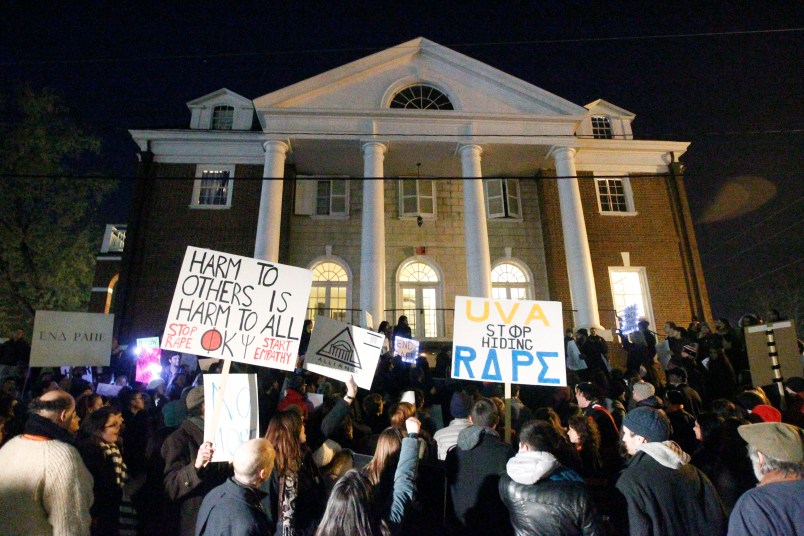Rolling Stone retracted its story about a gang rape at a University of Virginia fraternity on Sunday evening with the publication of an external review performed by the Columbia Graduate School of Journalism, but the magazine said it does not plan to fire any writer or editor involved in the story.
The report issued by Columbia found that Rolling Stone’s “A Rape On Campus” was the “story of journalistic failure that was avoidable,” and the review placed blame on reporter Sabrina Rubin Erdely, the magazine’s editors, and fact-checking department.
According to the report, Rolling Stone “set aside or rationalized” essential parts of the reporting process and did not make gaps in the storyline or shaky sourcing clear to readers. The report also concluded that Erdely should have contacted three friends of the victim, “Jackie,” who could have provided details about the night of the alleged rape, and that Erdely should have worked harder to identify the alleged attacker.
According to the review written by Columbia Dean Steve Coll, Dean of Academic Affairs Sheila Coronel, and postgraduate scholar Derek Kravitz, Rolling Stone needed clearer policies, such as on the use of pseudonyms and checking derogatory information with a second source. The report also charged that the magazine’s fact-checking department should be more assertive about worrisome reporting gaps.
However, when discussing the magazine’s process with the authors of the Columbia review, Rolling Stone Managing Editor Will Dana indicated that he did not believe the magazine needs new policies.
“It’s not like I think we need to overhaul our process, and I don’t think we need to necessarily institute a lot of new ways of doing things,” Dana told the authors of the report. “We just have to do what we’ve always done and just make sure we don’t make this mistake again.”
Coco McPherson, the fact-checking chief at Rolling Stone, agreed with Dana.
“I one hundred percent do not think that the policies that we have in place failed. I think decisions were made around those because of the subject matter,” she said.
In an interview with the New York Times, Sean Woods, the story’s editor, said that the magazine relied too heavily on “Jackie.”
“Ultimately, we were too deferential to our rape victim,” Woods said. “We honored too many of her requests in our reporting. We should have been much tougher, and in not doing that, we maybe did her a disservice.”
Erdely, the author of the now-retracted Rolling Stone article, apologized in a statement to the New York Times.
“The past few months, since my Rolling Stone article ‘A Rape on Campus’ was first called into question, have been among the most painful of my life. Reading the Columbia account of the mistakes and misjudgments in my reporting was a brutal and humbling experience,” she said. “I want to offer my deepest apologies: to Rolling Stone’s readers, to my Rolling Stone editors and colleagues, to the U.V.A. community, and to any victims of sexual assault who may feel fearful as a result of my article.”
Erdely acknowledged that she failed during the reporting process.
“[I]n the case of Jackie and her account of her traumatic rape, I did not go far enough to verify her story. I allowed my concern for Jackie’s well-being, my fear of re-traumatizing her, and my confidence in her credibility to take the place of more questioning and more facts. These are mistakes I will not make again,” she said.
In an interview with the New York Times, Rolling Stone Publisher Jann Wenner said that while the story had major gaps, some of the fault lies with “Jackie,” the alleged rape victim on which Rolling Stone relied for the story. Wenner said that he did not want to blame “Jackie” but said “there is something here that is untruthful, and something sits at her doorstep.”
Wenner said that Erdely would not lose her job reporting, and that Dana and Woods would not lose their editing jobs at Rolling Stone. Wenner said that the story on the gang rape at UVA “was not the result of patterns in the work of these people.”
In a statement to the New York Times, University of Virginia President Teresa A. Sullivan said that Rolling Stone “did nothing to combat sexual violence, and it damaged serious efforts to address the issue.” Sullivan said the magazine “unjustly damaged the reputations of many innocent individuals and the University of Virginia.”
Following the publication of Rolling Stone’s story on a horrific gang rape at a University of Virginia fraternity and the college’s supposed poor response to the victim’s assault, critics quickly poked holes in the story and questioned the magazine’s reporting. The magazine quickly published an editor’s note to say that they had lost faith in Jackie’s version of events and later commissioned the Columbia review.
Charlottesville, Va., police recently suspended their investigation into the rape after they found no evidence to support the narrative presented by Rolling Stone.







The bizarre part is having this trumpeted on p.1 of The Times today.
At least the fraternity doesn’t have a GoFundMe page.
Rolling Stone editor Will Dana told PBS no heads will roll because he does not want this story to “define” the reporters and editors involved. So no guarantees that something like this won’t happen again. Sheesh.
Rolling Stone doesn’t get it.
(and by “it” I mean journalism)
a scatter shot blast of poxes on the house of Rolling Stone & the original author.
a genuine issue gets side-tracked by sloppy / unprofessional work